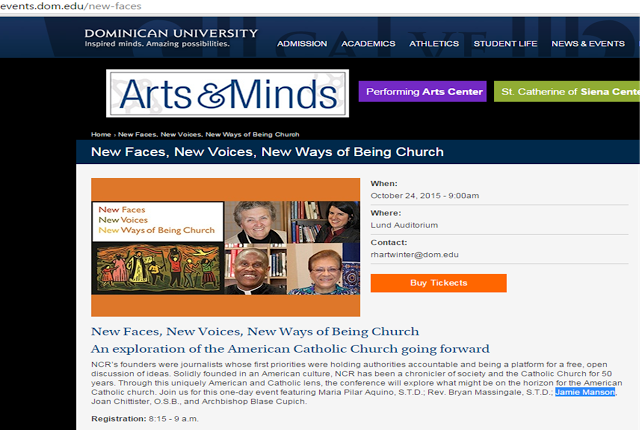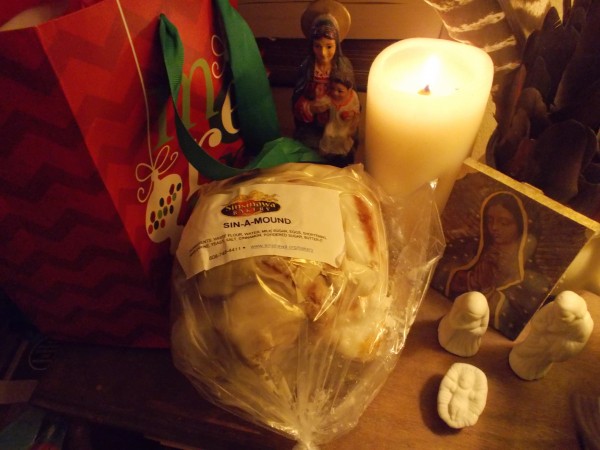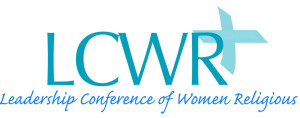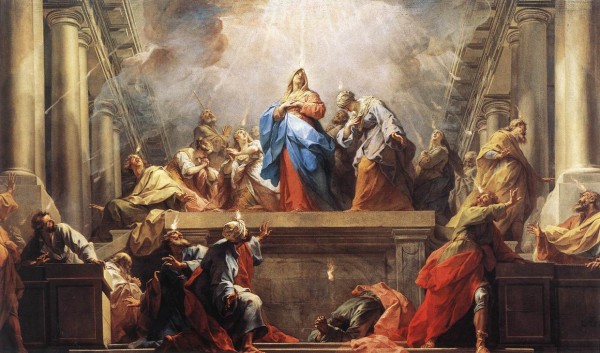Blog
Archbishop Cupich NOT attending Dominican University dissident conference?
Apparently, Joan Chittister, Jamie Manson, and Archbishop Cupich will not be having a get-together to “sing a new church into being.”
A month ago came some eyebrow-raising news that not only was the Sinsinawa Dominican Sisters’ Dominican University near Chicago to host a National Catholic Reporter dissident conference “New Faces, New Voices, New Ways of Being Church,” Archbishop Blaise Cupich himself was to be part of the festivities, celebrating Mass just after Sister Joan Chittister’s talk (at least according to conference organizers). Say what? The archbishop?!
Sister Joan was the one who wrote the foreword for one of the late Sr. Kaye Ashe’s radical feminist books, in which Joan is keen on the possibility of building “another church in the shell of the old one” (a seeming allusion to Karl Marx)… “it’s a new church whether anyone wants it to be or not.” Indeed, proposals such as “women’s ordination” which she has aggressively championed break the communion of the Church. Joan loves the shell of Catholic stuff like the Rule of St Benedict and the liturgical year, but she wants the core to be a different church, and she is an activist toward that end. If you want to know what the Sinsinawa Dominicans think about the Church, read my articles on their thoughts about the Eucharist and on their “relationship with the institutional church”.
Well, I notice today that the Dominican University website as well as the National Catholic Reporter website no longer mention Archbishop Cupich in relation to this event. I’d avoided making any assumptions about the significance of Cupich being involved with this affair, and I conclude that I was right to do so.
Here’s a screencap of what the conference page said before, if you look at the bottom of the text Cupich is mentioned, and further down the page where the schedule was listed (not shown in the screencap), he had been slated to celebrate the Eucharist.

The Dominican University website USED TO say Archbishop Cupich was involved with the conference and expected to celebrate Mass at its conclusion.
I wonder what happened, exactly.
Did the Archbishop agree to say Mass at Dominican University on that day without knowing what he was getting himself into, and back out when he found out what this really was? Did he never actually commit to it in the first place, but his name was exploited by the organizers? Who knows.
The thing is: it does seem like Archbishop Cupich, reputed to be hand-picked for Chicago by Pope Francis, is very comfortable with working with progressives and might go as far as he could to “accompany” the folks at Dominican University and even the National Catholic Reporter people. But those looking for him to out-Bernardin Bernardin might, hopefully, be disappointed.
A positive Final Report on the CDF Doctrinal Assessment of LCWR
I had been hoping (and suggesting, while being shot down by certain “experts”) the situation with the review of the US religious sisters’ leadership group LCWR was a little more positive than it looked. One reason was that when I sent my book A Report on the Sinsinawa Dominicans Today (a reform oriented work not geared toward a general readership, which can be read online or as a paperback) to the LCWR executive director Sr. Janet Mock (she has since been succeeded in that role by Sr. Joan Marie Steadman), I did get a reply and it was positive: “thank you so much for sending it to me” and “I really look forward to reading it.” I took her reply as sincere and was comforted by it.
My cover letter had made clear my strong valuation of and positive hopes for religious life, while highlighting in particular the problem (well known to anyone who studies contemporary religious life) of some religious sisters who refuse to regularly attend Mass, who redefine what the Eucharist is for them, express that they are at odds with and do not want to be part of “the institutional Church,” and who genuinely are not practicing Catholics, and stressing a request I had made to the LCWR in a previous letter about “Holy Wisdom Monastery” (an even graver situation of a former LCWR community truly falling out of ecclesial communion and becoming a non-Catholic sect): “Please help keep sisters Catholic and faithful.” I did not consider my hope unreasonable that Sister Janet’s positive reply reflected support for that goal by at least some key LCWR leaders.
The problem is real and most grave. If you would like to read the words of Dominican Sisters of Sinsinawa who had seriously questioned communion with the Church, see the chapter from my book “Moving Beyond the Church?” part 1 What is Eucharist for me? and ESPECIALLY part 2 Relationship with the Institutional Church. That part 2 includes the sisters’ candid reactions to the original LCWR Doctrinal Assessment. I have prayed for them every single day and encourage others to do so. God is our loving Father and He is listening; I believe prayer is one of the best and most loving ways to help.
The final report on the LCWR doctrinal assessment states as an important settled matter “the essential understanding of LCWR as an instrument of ecclesial communion.” Read the report to see what else they say they have accomplished. Congratulations and thanks to the LCWR and to the 3 US bishops and the CDF (who also all received my book and each sent notes of thanks) for this important commitment to being experts in communion, which I read with relief.
The Vatican’s press release reports:
Following the meeting, Cardinal Müller said: “At the conclusion of this process, the Congregation is confident that LCWR has made clear its mission to support its member Institutes by fostering a vision of religious life that is centered on the Person of Jesus Christ and is rooted in the Tradition of the Church. It is this vision that makes religious women and men radical witnesses to the Gospel, and, therefore, is essential for the flourishing of religious life in the Church.”
There is likely to be skeptical, cynical commentary about this by people who say nothing is changed on the ground level. I didn’t stick my neck out on this issue to be cynical but desiring to see some real help for the situation because I love religious life. I do think that this is a very positive development. Positive things are being said and positive action now needs to continue to follow from it.
Phil Lawler of CatholicCulture.org gives his commentary on the announcement this headline: “The CDF says the LCWR is acting Catholic. And that’s news.” He gives the report somewhat faint, but realistic praise:
Now that the intervention has run its course, Cardinal Gerhard Müller, the prefect of the Congregation for the Doctrine of the Faith, assures us of the Vatican’s confidence that the LCWR is “fostering a vision of religious life that is centered on the Person of Jesus Christ and is rooted in the Tradition of the Church.”
Again, shouldn’t you be able to take that much for granted? But in 2012, when this process began, you couldn’t.
Those statements from the two main parties do not guarantee that the Vatican intervention will prove successful. They do, however, demonstrate that the process was necessary.
The CDF’s Doctrinal Assessment of the LCWR did not directly have to do with individual religious congregations like the Dominican Sisters of Sinsinawa, Wisconsin. Rather it assessed an organization which their leaders and the leaders of other women’s religious congregations belong to, and which affects the majority of US women’s religious communities through these leaders. The problems in religious life could not be totally solved by the CDF process; major challenges remain. But my conviction is that the situation has been helped by the CDF’s work with the LCWR. Now will it bear good fruit on an ongoing basis?
Here’s to religious sisters being experts in Communion with Jesus and His Catholic Church! Let’s lovingly keep up our prayers for the sisters.
p.s. I noticed that Sister Loretta Dornisch passed away during Lent recently. May her soul rest in peace. Amen. She had been an Edgewood College professor and a couple of her very peculiar books were reviewed in A Report on the Sinsinawa Domincians Today.
On the Holy See’s Report on the Apostolic Visitation of Women Religious
The Madison Catholic Herald has a Letter to the Editor from me this week, commenting on the recent release by the Congregation for Religious of a gently-worded report summarizing the Apostolic Visitation a few years back of all the women’s “active” religious congregations in the US. Women religious are diverse, there’s no possibility of a one size fits all assessment of all sisters. Individual communities, including the Dominican Sisters of Sinsinawa who received an in-person visitation team (and say it wasn’t a bad experience at all) will get an individualized report that won’t be public. This is likely to be oriented constructively toward helping the community.
The Congregation for Religious’ approach respects and appeals to the conscience of sisters and suggests to them that further conscience formation in keeping with the mind of the Church is in many cases needed. Hearts need softening and minds need opening to the teaching and guidance of the Church, if this is to happen. Unfortunately Sinsinawa’s dominant belief system has seemed to be consolidating around the “Universe Story”/”new cosmology”/”conscious evolution” ideology. The Church has repeatedly warned that this has become a serious problem in religious life, and that this new-age belief system is simply not reconcilable with the Christian faith.
The hand of the Church is outstretched to the sisters, inviting renewal of their “yes” to communion and what that entails.
Here’s my Catholic Herald letter:
To the editor:
I praise the document of the Congregation for Religious in Rome, released as a final report of the visitation of women’s religious congregations in the U.S.
I am not known for sugarcoating grave problems within Religious life — but kindness is the only way to go for the Church’s pastors. Some Religious congregations aren’t only on a demographic cliff, but teetering on the edge in terms of ecclesial communion, as the document alludes.
This report isn’t simply sugarcoated, it’s lovingly sugar-encased, smooth and pastel like Jordan almonds. The good almonds in the middle are positive encouragements to respect the difference between vowed members and associated laity (not blur the lines), have a prayer life in common with Mass at the center and practice of the sacraments, foster a Catholic understanding of Christ and creation (not the “Universe Story”), and so forth.
The document guides women Religious to form their conscience according to the mind of the Church, becoming wise experts in communion.
Let’s remember others also have a role: Sisters need relationships for their mission in Christ that are based on Catholic ties in the communion of the Church and Catholic truth that comes from Jesus, in whom is ultimate wholesome sweetness.
Elizabeth Durack, Madison
Sin-a-Mound: a sweet gift!
A friend who knows me well got me the most thoughtful and funny Christmas present.

The tempting Sin-a-Mound humongous cinnamon roll, actually a cinnamon roll-like loaf of bread baked in a square pan.
Great for sharing with friends. If you eat the entire thing yourself at a sitting, you should probably go to confession. For those who need this but do not live near Sinsinawa Mound, it can be ordered through their website and shipped to you. They also have cinnamon swirl bread that doesn’t have icing on it and makes great cinnamon toast or French toast–as well as other varieties of “Mound bread”. I believe my friend probably got this from the Blessed Sacrament Parish Christmas Market at the end of November, and kept it in her freezer.

It looks good, and tastes even better. The bread isn’t really sweet, the sweetness comes mainly from the decadent icing.
Thank you to my friend, and to the Dominican Sisters.
Have a blessed Christmas!!
Join us in praying a Pentecost novena, for ourselves and for sisters
 My friends and I who make up the core of the Father Mazzuchelli Society have felt moved to pray a novena for religious sisters, and for those in formation in women’s religious communities, and we decided to let this be a proper novena of Pentecost, joining ourselves to the first novena or nine days of prayer of the Apostles and Mary after the Ascension of Our Lord while they waited for the descent of the Holy Spirit. We begin today and invite everyone interested to participate. Pray for yourself, and if you also feel called, pray for sisters and women in religious formation.
My friends and I who make up the core of the Father Mazzuchelli Society have felt moved to pray a novena for religious sisters, and for those in formation in women’s religious communities, and we decided to let this be a proper novena of Pentecost, joining ourselves to the first novena or nine days of prayer of the Apostles and Mary after the Ascension of Our Lord while they waited for the descent of the Holy Spirit. We begin today and invite everyone interested to participate. Pray for yourself, and if you also feel called, pray for sisters and women in religious formation.
Happily, blogging priest Father Z has decided to make daily AUDIO postings of this traditional Pentecost Novena of the 7 Gifts of the Holy Spirit. This is a beautiful and simple way to join in, and will take less than 10 minutes out of your day. Day 1 of the Novena is here, and after reading the prayers he includes also a moving and vigorous recording of the Veni Creator Spiritus. Check Father Z’s blog on subsequent days for the next installment.
link to full novena text | link to convenient print-able RTF file that will open in your word processor
Father Mazzuchelli and the New Evangelization article in the Madison Catholic Herald
I have written an article which appears in this week’s Madison Catholic Herald. The Herald has had quite a few articles recently about Father Mazzuchelli, surrounding the 150th anniversary of his death which was honored with the annual memorial Mass at St Patrick’s Church in Benton, with about a dozen priests in attendance this year. I found reporter Kevin Wondrash’s photos worth looking at. I teach catechism at 9 am Sundays at the Cathedral Parish (and I don’t drive) so I could not be present for the 150th anniversary Mass–though as noted in my article below we observed the occasion at the Cathedral Parish with a reading group that discussed his Memoirs.
Father Mazzuchelli and the New Evangelization: frontier missionary priest’s memoirs provide inspiration for us today |
| Guest column |
| Written by Elizabeth Durack |
| Thursday, Mar. 13, 2014 — 12:00 AM |
Anyone who has read with interest the recent articles in these pages on the life of Venerable Father Samuel Mazzuchelli, O.P. would do no better than to read his fascinating and edifying Memoirs.
Several readers have met at the Cathedral Parish in Madison weekly to discuss what inspiration we find for the New Evangelization from Father Mazzuchelli’s writing. I share these gleanings.
A frontier adventure
This 1844 book is a frontier adventure with bears and wolves which, like every account of the life of a saint, is also high adventure in the Faith.
The Christian life is always a hero’s mission. Semper et ubique (always and everywhere) the odds seem wildly against our hero (Jesus, His priest, or any of His faithful disciples); something is wrong if parish life becomes simply routine.
From the time he arrived at his first assignment on Mackinac Island as a new priest, aged 22, the missionary Father Mazzuchelli countered anti-Catholic teaching by engaging in public disputation good-naturedly and with compelling presentation of truths of the Faith.
Winning converts
It won Catholics back and made converts. Kind, genuine, and ready to lend a hand, the priest also formed warm ecumenical friendships that lessened prejudices about Catholicism.
He had a Dominican confidence in the power of [the] Holy Preaching and was adamant about not dumbing down the Faith he proposed.
Writing in the third person, Father Mazzuchelli says: “[W]ithout reference to [the Indians’] ignorance or their knowledge he only announces the spotless, unalterable Faith in which he himself has been instructed and which all the Catholics of the world have believed from Apostolic times.”
He didn’t make it overly difficult to convert: “the Catholic method” required “only the giving up of vices and the will to believe in those doctrines which independently of mere reason, are learned without arguments or disputations, and even without books, but simply by hearing, as says Saint Paul, in his Epistle to the Romans, X, 17, ‘the Faith cometh by hearing.’”
Father Mazzuchelli tells many moving stories of pioneer folk and Indian converts as edifying Christian examples and witnesses to the Mercy of God in the sacraments.
Sacrament of Confession
He writes, “Guided by the dictates of conscience, the Indians recognize Confession as the most natural effect of a true repentance.”
Back then it was universally understood that confession of all grave sins precedes reception of Holy Communion. The beneficial promotion of frequent Communion since 1903 couldn’t change the fact that we objectively need to be in a state of grace to benefit from the Sacrament of the Eucharist, but at some point people’s understanding and practice radically broke down and much has been lost as a result. The Sacrament of Reconciliation is key for saving souls, then and now.
Evangelizing among the poor
Evangelical poverty was essential to his personal credibility as well as his easily-contented adaptability to rough conditions among those to whom he ministered, who were almost all very poor.
“There is no doubt,” he wrote, “that the Christian religion was propagated primarily in the midst of poverty . . . rarely were the rich among the first to submit to the doctrine of a God-made-man for us, born in a lowly manger.”
My friendships with Madison’s homeless suggest this has not changed, but how well are we evangelizing the poor?
Prognosis for the future
The great Dominican’s diagnosis of the religious problems he witnessed included a sadly accurate prognosis for the future.
In the religiously pluralistic frontier environment, hostilities could only be avoided by “the indifferentism which is a culpable abandonment of every Christian truth.”
This increasing religious indifferentism was accompanied also by a rising skepticism which he saw as dangerous to religious freedom: “Woe to that country if the mass of its people shall ever become unbelievers! Then will it lose that protection which makes it now so free to act, and enslaved by general corruption, its ruin and disintegration, humanly speaking, will be irreparable.”
On the other hand, says the indomitable missionary, “where unbelief reigns, there assuredly has he a motive to extend the Kingdom of God.”
Memoirs re-published
Read for yourself: I re-published the 1915 translation of Father Mazzuchelli’s book last year under the title Memoirs of a Frontier Missionary Priest. My goal was to make it inexpensive (I don’t make a penny) and help it find new readers. It’s available on Amazon.com for around $6.50.
Elizabeth Durack is a member of the Cathedral Parish in Madison. She blogs at www.laetificatmadison.com
Father Mazzuchelli book group to meet
 I have a go-ahead from the Madison Cathedral Parish to organize a parish book group at Holy Redeemer Church to read Venerable Fr Samuel Mazzuchelli’s Memoirs beginning in January. This will be an ideal way to observe the 150th anniversary of this great priest’s death, which falls on February 23rd of 2014. I am hopeful that a lot of grace may come from this study, which is oriented toward the New Evangelization. It is a parish program but I certainly would welcome people from outside the Cathedral Parish participating. If you are interested, watch the Cathedral Parish bulletin or website, or email me.
I have a go-ahead from the Madison Cathedral Parish to organize a parish book group at Holy Redeemer Church to read Venerable Fr Samuel Mazzuchelli’s Memoirs beginning in January. This will be an ideal way to observe the 150th anniversary of this great priest’s death, which falls on February 23rd of 2014. I am hopeful that a lot of grace may come from this study, which is oriented toward the New Evangelization. It is a parish program but I certainly would welcome people from outside the Cathedral Parish participating. If you are interested, watch the Cathedral Parish bulletin or website, or email me.
The Father Mazzuchelli Society has published an attractive new edition of Fr Mazzuchelli’s Memoirs at the lowest price ever, under the title Memoirs of a Frontier Missionary Priest. It is around $6 on Amazon–I don’t make a penny. This book is excellent, too little known, and deserves to be more widely read. It’s exceptionally inspiring and thought provoking for the New Evangelization especially in our lands where Father Mazzuchelli lived his mission. It is spiritual reading and frontier adventure all in one. THIS WOULD MAKE AN IDEAL CHRISTMAS GIFT and especially so for a priest or seminarian!
This entirely positive and evangelical trajectory is where I am really headed with promoting the legacy of Father Mazzuchelli. Our edition of the memoirs has nothing negative about the Sisters. The Report on the Sinsinawa Dominicans Today is a reform document, so it is more or less about understanding some of what is awry and what we are saying “no” to. And it is a cry from the depths of brokenness, an expression of the need for the Holy Spirit. The trajectory we need is really about what we are saying “yes” to and what we have to do with the good that Jesus wants to do for all people.
Here are some of my most recent thoughts regarding evangelization. Our city, our diocese is full of broken and hurting people. Jesus is the only healer of the deep woundedness of every person. I have been thinking and praying about evangelization, about my own experience as a former progressive of a typical Madison type, and I feel that the new evangelization needs the evangelization-minded faithful to be formed in a deep sympathy toward those we seek to evangelize and have a message and mission of healing.
We’re not the healers. Jesus is. We’re wounded people too. I am not going to get all Henri Nouwen (I haven’t read that book). But we have to be credible and attractive as His friends, witnesses to Him. Many know quite well that they are wounded and suffering but do not understand the whole nature of that or how they could be healed.
Some of you know my favorite Saint is John of the Cross–whose feast day is coming up in mid December. He’s the Church’s preeminent teacher of mystical theology, and someone who profoundly understood people, spiritually and psychologically. Imagery of the wound of love, cauterized and transformed by God is central to his teaching. God’s love and the very woundedness of the soul is in a way the reason for God uniting Himself with us–as in the Exsultet, “o happy fault, o necessary sin of Adam that merited for us so great a redeemer.” There is a greater good. There is good news!
The woundedness of the people in Madison cries out for Jesus and first of all we need to listen to their hurt, and then help people to recognize it can be healed only by God. We also need to care about people’s other problems, including the problem of material poverty (and selfishness) which for instance is one reason why people are afraid of marrying and having a family. Through my own experience I believe this approach of pity, mercy, sympathy with people’s deep interior suffering is something really essential for evangelizing the liberals. They’re looking for healing and love and solutions in all the wrong places. We in fact have the answer.
Therefore: let us watch our thoughts and tongues and not speak of them as the enemy or mock them or be angry… that is regarding them politically rather than humanly and from a supernatural perspective as people who need Jesus, who need to be in relationship with God, who need prayer and the Sacraments and the Church. How can we be more ready for the mission to the people of Madison? How can we be formed? How should we reach out and propose the good news?
I am looking forward to joining with other Catholics in reading Fr Mazzuchelli’s memoirs together and coming into a kind of dialogue with him about the Catholic mission in our own day.
(cross posted at my personal blog Laetificat)
Happy birthday Father Mazzuchelli!
 We had a lovely birthday party for Fr Mazzuchelli on Monday the 4th, in downtown Madison! I think there were ten of us. We prayed the Joyful Mysteries of the Rosary and the prayer for his Beatification, and then potluck dinner and birthday cake. A very pleasant occasion. We discussed his legacy and how we can make that better known to inspire people for the New Evangelization.
We had a lovely birthday party for Fr Mazzuchelli on Monday the 4th, in downtown Madison! I think there were ten of us. We prayed the Joyful Mysteries of the Rosary and the prayer for his Beatification, and then potluck dinner and birthday cake. A very pleasant occasion. We discussed his legacy and how we can make that better known to inspire people for the New Evangelization.
The 150th anniversary of Father Mazzuchelli’s death is coming up this coming February. The Sinsinawa Dominicans will emphasize him as “social justice crusader” in their own image. He was indeed very good on social justice, but it is a serious distortion to narrow his legacy to this. He was a Catholic missionary, winning people over to Jesus, proclaiming and defending Catholic truth.
I have had some more responses to my Report on the Sinsinawa Dominicans Today, including a note from a fine bishop involved in reforming the LCWR. I also received a very nice handwritten note from a Dominican Prior Provincial on a notecard with Veritas on the front just like my book. This is a reform document written above all for those who are in a position to foster the reform and real health of this religious Congregation and others.
I have noticed belatedly that the Sinsinawa Dominicans fixed SinsinOP in such a way that it is not visible to the public anymore. Certainly prudent. Anyone in need of source text or etc substantiating or adding information to my Report should contact me elizabethdurack@gmail.com as I can most likely provide what you are looking for.
More reactions to the Report on the Sinsinawa Dominicans
The feedback on the Report on the Sinsinawa Dominicans Today has been very good. One priest gave it a 96% on account that it is not very perfectly edited! True! A reader who purchased the book on Amazon left a nice review there:
The breakdown of religious orders is something I have been studying for some time as part of the work of the Catholic apostolate I founded, and this very well researched and well written book about one specific order and how it slowly unraveled is superb.
I have not found any other work that reaches such a level of specificity while connecting to the larger story–a very sad story–of the breakdown of so many orders of nuns and sisters in our country over the past few decades.
The author is a deeply devout Catholic and her concern and care for the strength of the order she examines is very evident.
I highly recommend it.
David H. Lukenbill
The Lampstand Foundation
Cardinal George’s office sent a nice pre-printed card acknowledging receipt of my correspondence and saying it had been passed on to the Cardinal. Though this is not a comment on the content of the book.
Yesterday I had an email from another bishop who received a copy of the book edition and thanked me. He thought the phenomenon of Sisters within various Orders who “have some members who essentially are no longer Catholic, yet remain within the institution” is disturbing, and had some kind words and prayed for the Dominicans and me.
 Today I had a postal letter from Sister Janet Mock, Executive Director of the Leadership Conference of Women Religious. For real. My cover letter when I sent the book to LCWR reminded them that I had written back in February sending the testimonies regarding why Catholics should not support the former LCWR community Holy Wisdom Monastery that left the Church, and I reiterated what I’d said in that previous letter, “please help keep Sisters Catholic and faithful.” Here is her letter, which doesn’t respond to precisely that issue but I think makes a good impression of her:
Today I had a postal letter from Sister Janet Mock, Executive Director of the Leadership Conference of Women Religious. For real. My cover letter when I sent the book to LCWR reminded them that I had written back in February sending the testimonies regarding why Catholics should not support the former LCWR community Holy Wisdom Monastery that left the Church, and I reiterated what I’d said in that previous letter, “please help keep Sisters Catholic and faithful.” Here is her letter, which doesn’t respond to precisely that issue but I think makes a good impression of her:
Dear Ms. Durack:
I received your letter dated October 11, 2013, along with your book, entitled A Report on the Sinsinawa Dominicans Today. Thank you so much for sending it to me.
You have obviously put a lot of time and effort into compiling the data for this book. I really look forward to reading it. I can only imagine the relief and satisfaction you must feel now that the book is in print. Congratulations on adding to the body of work about women religious.
Sincerely,
Janet Mock, CSJ
I both appreciate and respect her willingness to read the book. LCWR knows the problems are real, and they are ideally positioned to actually help things get better. I am praying they will, and ask your prayers too for the LCWR. I am not a cynical person. I think everything awry can turn around if people listen to the Holy Spirit.
Finally, the Father Mazzuchelli Society is planning a get-together at a private home for prayer (the Joyful Mysteries of the Rosary and the prayer for Fr Mazzuchelli’s Beatification) and potluck the evening of Monday, November 4th, which is Venerable Samuel Mazzuchelli’s birthday! If you are local in Madison and want to attend this, email me: elizabethdurack@gmail.com
“Like” us on facebook
The Father Mazzuchelli Society now has a “Like” page on facebook.
https://www.facebook.com/fathermazzuchellisociety





